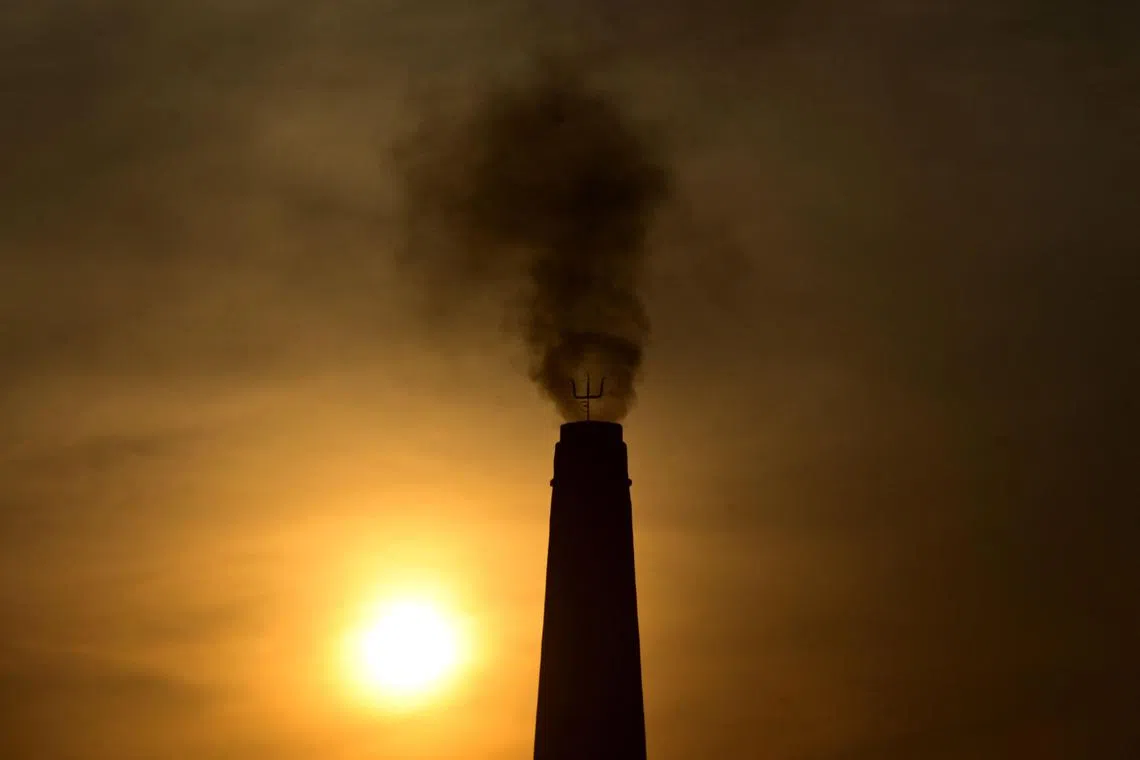Most nations aiming for net-zero fail to meet targets, study shows
Sign up now: Get ST's newsletters delivered to your inbox

About 90 per cent of net-zero plans by a group of about three dozen countries are unlikely to be achieved.
PHOTO: AFP
LONDON – A new scientific assessment of government commitments to eliminate greenhouse gas emissions found most lack credibility and would put the world on track to experience catastrophic global warming by the end of this century.
About 90 per cent of net-zero plans by a group of about three dozen countries are unlikely to be achieved, with confidence levels of “lower” or “much lower,” according to a study published Thursday in Science. Among the laggards are India, Australia, Brazil, Indonesia, South Africa and the United Arab Emirates, host of the upcoming United Nations climate summit. The world’s top two emitters, China and the US, ranked in the “lower” category.
“Achieving net-zero is difficult, but just looking at the near term and taking the first steps is not enough,” said Professor Joeri Rogelj, the paper’s lead author and a professor of climate science at Imperial College London. “The hard steps in the long run need to be planned for today.”
Only New Zealand, the European Union and the UK ranked in the “higher” confidence category, but big challenges remain despite better progress towards net-zero. While Europe’s energy sector has gone a long way to reduce its emissions, carbon pollution has been more stubborn in the agricultural and industrial sectors.
Greenhouse gases emitted by human activities have caused the planet to warm by about 1.2 deg C since pre-industrial times, altering weather patterns and intensifying deadly events like heat waves, wildfires and cyclones. Global temperatures will increase anywhere between 1.7 deg C and 3 deg C by 2100, depending on the level of emissions over the next few years, according to the study. Even the lower end of that range exceeds the 1.5 deg C of warming
To assess countries’ emission-reduction goals, also known as Nationally Determined Contributions, or NDCs, the researchers looked at whether they were legally binding, whether they had laid out credible policies for implementation and whether the countries’ near-term emissions are trending downwards. In most cases they found a gap.
For the lowest-ranking countries, Prof Rogelj said that “after they made a pledge or a promise, there’s very little evidence on the ground that this translated into action”.
Prof Rogelj focused on the bottom-tier ranking of the UAE because of its crucial role as host of COP28, where every nation is expected to participate in a global stocktake on efforts to curb emissions. The country’s plan was given the lowest score because its target isn’t legally binding, there’s no policy plan to implement it and there’s no indication that the country’s emissions are declining, the researchers wrote. The UAE’s net-zero plan also doesn’t clarify which greenhouse gases its target covers.
Spokesmen for the UAE’s Environment Ministry and COP28 did not reply to requests for comment. The COP28 team has previously said that the environment ministry is working on a new NDC.
A COP presidency, while hosted by a government, is expected to take a neutral stance. Yet past COP presidencies have used an ambitious NDC from their host government as an example to showcase how to set credible targets, said Prof Rogelj, and “the fact that the UAE scores so low puts a very low credibility mark on their presidency as a whole”.
Scientists ran projections of future temperature increases with and without policy changes. Under the most conservative scenario, which considers only policies that have been implemented and not pledges, global average temperatures would rise between 1.7 deg C and 3 deg C by the end of the century. Under the most optimistic scenario, where all country promises materialise, temperatures would rise between 1.6 deg C and 2.1 deg C.
But the window of achieving those goals is getting tighter.
In a separate study also published on Thursday, Prof Rogelj and his colleagues found that the carbon budget – the amount of carbon dioxide that can be dumped in the atmosphere without breaching temperature targets – is shrinking faster than previously thought. The updated numbers show that, if emissions continue at the current rate, the world will exhaust its budget for 1.5 deg C before 2030. That means countries now need to make even steeper emissions cuts this decade if they want to avoid the worst impacts.
Every 0.1 deg C of global warming matters. But scientists consider any warming above 2 deg C to be disastrous for human life and the environment. Even below that threshold, some ecosystems will change irreversibly, altering natural resources and challenging human survival in many parts of the world.
“It’s not only that whatever we do now is not fast enough,” Prof Rogelj said. “But that in some cases it’s hard to see any progress at all after pledges have been put forward, and that’s really worrying.” BLOOMBERG


